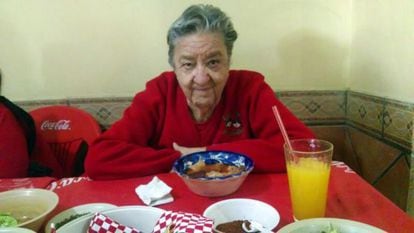Mamá Rosa suffering from dementia, says Mexican Prosecutor General
The 80-year-old founder of La Gran Familia no longer has the capacity to run the shelter

The Mexican Prosecutor General’s Office has announced that it will not bring charges against Rosa “Mamá Rosa” Verduzco because federal law prohibits indictment of the elderly. The 80-year-old educator has been diagnosed with senile dementia and will no longer be in charge of La Gran Familia shelter. Last week, Mexican police and military officers found more than 600 people, including 492 children, living in overcrowded rooms at the center.
Verduzco, who founded the home in 1947 in Zamora (Michoacán, western Mexico) will not be charged for any of the crimes committed at her establishment. Around 10 children testified to cases of mistreatment. But the Prosecutor General’s Office dropped the charges against Mamá Rosa on Saturday due to “lack of evidence.” The prosecutor did, however, bring charges of sexual abuse, physical assault and deprivation of liberty against six of the eight caretakers who were arrested with her.
Verduzco will not be charged for any of the crimes committed at her establishment
Mamá Rosa came from a wealthy Zamoran family. She raised thousands of children at her shelter and became a symbol of this conservative Catholic city of 140,000 residents. Thousands of people who left the shelter remember her fondly. “Despite everything, she’s the only real mother I’ve ever had,” a boy told the newspaper El Universal on Sunday. Some of the people standing in front of the hospital where she was said Mamá Rosita was the only one who had helped them. “She was tough but she had to be.” Many of those who left the center later attended a university.
La Gran Familia has been the subject of accusations for at least 30 years of its almost 70-year history. In 1985, Alina García, a journalist from Guadalajara (Jalisco, a neighbor state to Michoacán) investigated the case of a family that could not get their son back after leaving him in Mamá Rosita’s care. “They tried to talk to her then they reported it to the authorities but nothing happened,” García says. There have been at least 20 official complaints against her in Michoacán alone. In 1989, some charges were quickly dropped after a brief investigation. Mamá Rosa fêted then-governor Genovevo Figueroa with a musical band. According to news articles from that time, she said: “Let’s congratulate the governor, children, because he’s showing that he’s got balls.” The complaints continued but there was never an answer. The last one was filed this year.
Despite everything, she’s the only real mother I’ve ever had,” said one boy
At least 20 complaints were filed in Michoacán to ask the Prosecutor General’s Office to investigate the alleged crimes taking place at the shelter. Former governors Lázaro Cárdenas Batel and Leonel Godoy Rangel were in power when several of these reports came in. Both defended Verduzco this week.
On Monday, the attorney general announced that the office had received 150 more complaints since the authorities had entered the shelter, the worst case being one of deprivation of liberty. Mamá Rosa made some of the parents who left their children at the center sign a notarized document that put her in charge of their education until they came of age. But, according to various testimonials, if the parents ever regretted their decision, she refused to give up the kids and demanded money in exchange. The notarized document had no legal weight because Mexican law says those rights still belong to the parents unless a judge rules against them.
La Gran Familia has been the subject of accusations for at least 30 years of its almost 70-year history
Authorities have freed 138 adults who were held captive at the center and they have taken 167 children to public shelters. There are about 300 more children at the home. The future of the establishment remains uncertain. Since Mamá Rosa has not been charged, she could ask the state to give her back her property.
It also remains unclear what happened to the million-dollar donations her organization received over the years from businesses, NGOs and even from the Mexican government itself.
Translation: Dyane Jean François










































